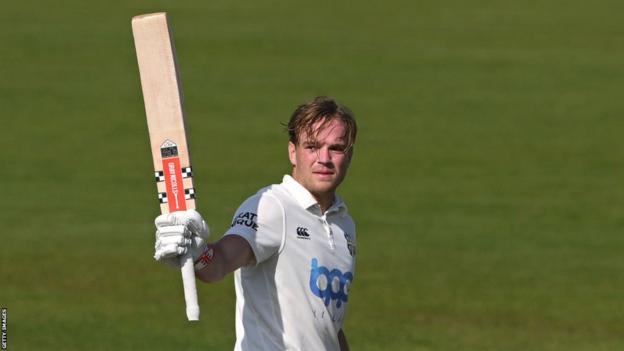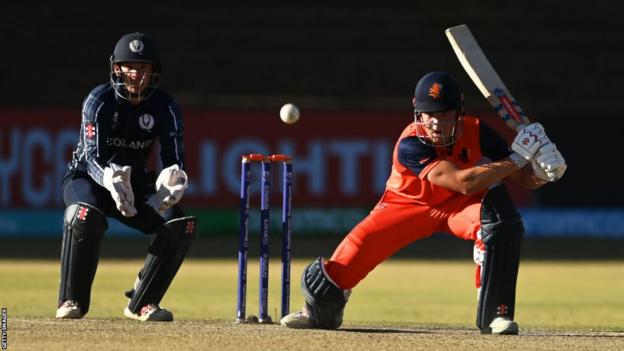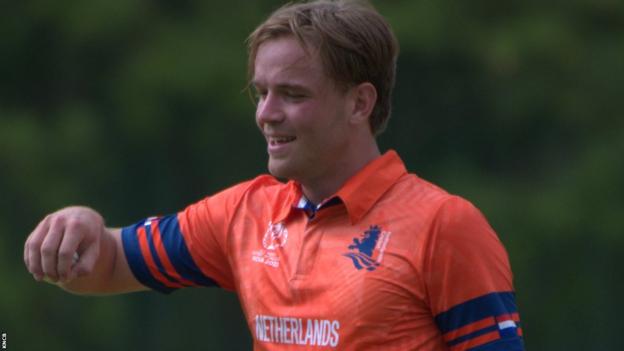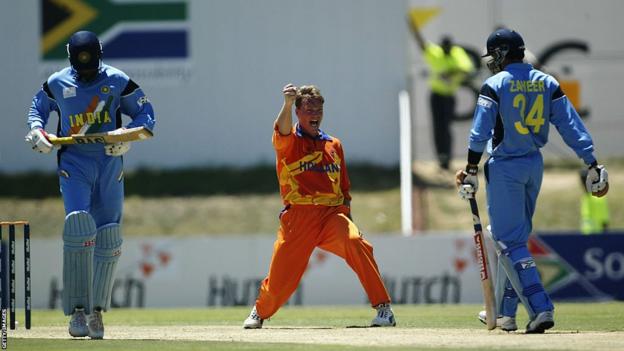

Tim de Leede’s World Cup story with the Netherlands began in considerably less glamorous surroundings than what his son Bas is now used to.
Inside a chilly multi-sport hall at USV Hercules in Utrecht in the early months of 1996 he gathered with his Dutch team-mates for weekly training sessions.
The Netherlands had qualified for their first World Cup but for a group of amateur players – schoolteachers, marketing managers, book shop workers and alike – preparations were rudimentary.
“There were no real facilities for cricket training during the winter in those days apart from a club in Utrecht with one indoor net,” Tim told BBC Sport.
“We only had enough time for our top four to bat – imagine that! We went to the World Cup and only four of us had hit some balls, like 15 minutes of hitting at a time.
“In 1996 we basically played on talent alone. We didn’t train to become better because there was simply no room for that.”
Even in the noughties, Tim remembers training camps held in multi-sport facilities in Rotterdam and being annoyed because 40 minutes of every session “was wasted putting the nets up and then taking them down again”.
De Leede Sr, who is the Netherlands’ most-capped player after 237 appearances in those distinctive Oranje shirts, speaks with a fondness rather than frustration of the era, though.
He chuckles when recalling the 2003 World Cup and how the Dutch players were given tracksuits after the country’s cricket federation (KNCB) had got their hands on some which were surplus from the Netherlands Olympic team that travelled to the Sydney Games three years previously.
A clever idea on the face of it, but with many earmarked for volleyball players most of the cricketers were drowning in them.
Bas de Leede, meanwhile, looks every inch the modern international cricketer, in his dark blue slim-fitting Netherlands training gear with orange trim.
The 23-year-old arrived in India later than his team-mates, having been involved in the penultimate round of the County Championship. Bas helped Durham win promotion back to Division One, notching his maiden first-class century against Sussex during the run-in.
Most of his colleagues in the Netherlands squad have spent the past fortnight at a ‘spin clinic’ before their first game against Pakistan, attempting to address a lack of experience against the turning ball on subcontinental pitches.
The KNCB ran a social media campaign to find suitable net bowlers in India to help preparations, whittling down 10,000 applicants to four, including two spinners.
It’s a sign of where the Netherlands are now at, and how far they have come from Tim’s day, when the team only had a coach during the summer months. It feels like there has been a reboot as the Dutch prepare for their first 50-over World Cup since 2011.
“There has been a shift,” Bas told BBC Sport. “What I’ve seen in the past few years is that it’s developed so much. Not necessarily only the way we train, but there’s been more contracts on offer to play.
“We have more footage, plans and analysis these days. I think we can continue getting more and more professional with the way we play.”
Dutch cricket journalist Bertus de Jong cited the loss of ODI status in 2014 – regained a year later – and the appointment of South African Anton Roux as coach in 2013 as a key juncture to when the side started to get its act together.
Yet despite the fact cricket has been played in the Netherlands since the 19th century, the forthcoming World Cup will barely make a ripple in the country, added de Jong.
“In the days of terrestrial TV and four channels, one of which was the BBC broadcasting Test matches, a lot of people in the Netherlands would have recognised cricket,” he said.
“Now it has very much on the periphery. It has drifted out of the sporting consciousness.”

‘Cut me and I bleed Oranje…’
The trajectory of Bas de Leede’s career has been on an upward curve, but playing international cricket for an ICC Associate nation while attempting to make a living out of the game can be conflicting.
It has been commonplace for Dutch players, understandably, to prioritise their county paymasters ahead of playing for their country. When England racked up a record ODI total of 498-4 against the Dutch in Amstelveen last year the hosts were not at full strength.
Under ICC regulations the KNCB can demand their mandatory release but given the small pool of talent, there is a reluctance for players to rattle cages.
The result is the Netherlands struggle, at times, to get their best XI on the field. That included the qualifying tournament in Zimbabwe in June and July, slap bang in the middle of the English summer, when they had to select a weakened team.
There was a notable exception as Bas acknowledged that if you cut him “he bleeds oranje”.
Indeed, the offer of a contract from Durham was left on the table unsigned by Bas for several weeks until the county acquiesced on his desire to play for the Netherlands. He eventually confirmed a two-year deal in February 2023.
“From the moment I spoke with Durham, I told them this is what I want to do. I want to play the qualifiers for the Dutch,” Bas explained.
“I said, ‘if you let me, I’ll be happy to sign, but if you don’t, I might try and sign next year if you guys are still interested’. I was pretty hard on that. Luckily, they said they were happy to release me for the qualifiers.”
Most of the Netherlands players today just about make their living from the game in one shape or form. But you do not have to scratch far below the surface to find players supplementing their income, or planning for life after cricket.
Skipper Scott Edwards, born in Tonga, raised in Australia and qualifying through a Dutch grandmother, originally trained as an electrician.
Gloucestershire’s Paul van Meekeren went viral during the pandemic when he tweeted: “Should’ve been playing cricket today. Now I’m delivering Uber Eats to get through the winter months!”
For Tim de Leede, holding down a day job was the norm. He spent much of his career working with Dutch telecom and it was often a case of a player persuading their employer to allow them to take their holiday entitlement in one chunk, or unpaid leave, to participate in tournaments.
“I think some guys even quit their jobs, or were sacked, to play in World Cups!” Tim added.
“We didn’t get any money for playing, but there was no complaining from anyone. We were just going to enjoy it, we were going to give it our best shot no matter what happened. That formed unity I think.
“Luckily most of the guys involved today are making some sort of a living through cricket. They can, to quote ex-Netherlands captain Peter Borren, pay the rent through cricket. Not make much money, but at least pay the rent.”
Alongside his Durham commitments Bas is studying business administration at Rotterdam School of Management.
England given a glimpse of ‘Basball’

Tim de Leede’s grandparents opened one of the first supermarkets in the Netherlands around the same time as Albert Heijn did the same in Zaandam.
“They were a bit more entrepreneurial than my grandparents,” said Tim. “My ancestors stuck to the one shop, the Albert Heijn company has something like 1,000 supermarkets in Holland now!”
The De Leedes are one of the most well-known families in Dutch cricket, though. as both Tim’s father and mother played the game.
“They actually met at a cricket club and my mum would say she is the bigger cricket fan,” added Tim, who now runs a cricket equipment shop in the sleepy town of Nootdorp.
His youngest son Tom is a “fantastic prospect” in the Netherlands youth ranks, while Tim’s niece Babette plays for the Dutch women’s team and elder brother Patrick is the KNCB’s press officer.
It was in competitive games in the back garden at family gatherings, and then later playing alongside his father at Voorburg CC, where Bas, full name Bastiaan Franciscus Wilhelmus de Leede, developed his thirst for the game.
From there, Bas progressed through the age-group sides and made his ODI and T20 debut for the Netherlands in the summer of 2018.
At the Cricket World Cup qualifier in Zimbabwe earlier this year Bas carried his family’s hopes – and the estimated 6,000-strong cricket community at home – on his back.
It would prove to be a breakthrough tournament for the emerging all-rounder.
During England’s one-day series in the Netherlands last year Bas had gleaned snippets from speaking to their white-ball maestros; their ruthless intensity with the bat and disciplined strategic approach to bowling.
In a winner-takes-all clash with Scotland at the qualifier, much of what he had gleaned from those conversations came to the fore as he virtually single-handedly propelled the Netherlands to India.
Bas had taken 5-52 to restrict the Scots to 277-9, which they needed to chase down in 44 overs to overhaul their opponents on run rate.
The Dutch needed 102 from the last 10 overs, but De Leede’s incredible 123 off 92 balls – his first ODI century – inspired them to victory.
Bazball had morphed into Basball.
De Leede Jr, who became only the fourth player to take five wickets and score a century in a ODI, breaks into a smile before he humbly plays down the term.
“I don’t know my own game well enough yet for it [Basball] to mean anything,” he said. “I’ve heard it mentioned a couple of times, especially by fans. I thought it was quite funny.
“But playing England in the World Cup will be quite special. We got smashed by them last summer, but hopefully we can do better this time.”

Tendulkar signed the match ball…eventually
The Netherlands have two wins in 20 matches at 50-over World Cups, with Tim playing in victories over Namibia in 2003 and Scotland in 2007.
They have never beaten a full ICC member in their four appearances at the tournament – the last of which came in 2011.
The gap between the top ICC Associates and full members has narrowed on the pitch, even though there is still a chasm in their respective budgets, resources and amount of matches played.
“For many reasons Test cricket is never going to happen for the Netherlands,” Tim added. “The ICC needs to overhaul the way it funds the game to reflect that.”
Indeed, the use of the term ‘Associate member’ has become a bit of a dirty word for Dutch coach Ryan Cook, a coaching disciple of fellow South African Gary Kirsten.
Cook’s blue-sky thinking has instead led him to Johan Cruyff and the term ‘Total Cricket’ – a nod to the most famous exponent of a brand of Dutch football from the 1970s largely credited to coach Rinus Michels.
Despite their pasting by England last summer the Dutch edged out full members West Indies, Zimbabwe and Ireland to secure their spot at the World Cup which has left Bas feeling bullish about their prospects in India.
“Our goal is to get to the semi-finals,” he said. “It would be pretty pointless to turn up and not have that as a goal.
“The cricket we played over the last year has been pretty good. Now it’s about whether can we produce what we’ve done against better quality sides on a bigger stage.”
For dad Tim, who is travelling out for games towards the end of October, it will evoke memories of the three World Cups he played in – and rubbing shoulders with Shane Warne and Nelson Mandela.
On the field, one of the highlights was taking the wicket of the legendary Sachin Tendulkar in 2003 when the Dutch gave India a fight.
“I took four wickets against India, umpire Peter Willey gave the ball to me as a memento,” he recalled. “I wanted Sachin to sign it, but by the time I’d done media duties the India team had left.
“Some years later Tendulkar was in the Netherlands getting some treatment on an elbow injury and a physio friend tipped me off. He was gracious, remembered the game and kindly signed it for me.
“Now it’s Bas’ turn to take on the best. He’s a much better player than I’ve ever been. This team is by far the best the Netherlands has ever had. Hopefully they can cause an upset.”
